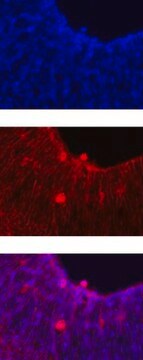N6786
Anti-Notch1 antibody, Mouse monoclonal
clone mN1A, purified from hybridoma cell culture
Synonyme(s) :
Notch antibody
About This Item
Produits recommandés
Source biologique
mouse
Conjugué
unconjugated
Forme d'anticorps
purified from hybridoma cell culture
Type de produit anticorps
primary antibodies
Clone
mN1A, monoclonal
Forme
buffered aqueous solution
Espèces réactives
mouse, human
Technique(s)
immunocytochemistry: suitable
indirect ELISA: suitable
microarray: suitable
western blot: 1-2 μg/mL using extracts of cells stably transfected with a truncated Notch1 (32D-mN1-ICDOP that expresses the intracellular mouse Notch1 molecule-65 kDa).
Isotype
IgG1
Numéro d'accès UniProt
Conditions d'expédition
dry ice
Température de stockage
−20°C
Modification post-traductionnelle de la cible
unmodified
Informations sur le gène
human ... NOTCH1(4851)
mouse ... Notch1(18128)
Description générale
Spécificité
Immunogène
Application
- enzyme linked immunosorbent assay (ELISA)
- immunoblotting
- immunocytochemistry
- immunohistochemistry
Actions biochimiques/physiologiques
Forme physique
Clause de non-responsabilité
Vous ne trouvez pas le bon produit ?
Essayez notre Outil de sélection de produits.
En option
Produit(s) apparenté(s)
Code de la classe de stockage
10 - Combustible liquids
Classe de danger pour l'eau (WGK)
nwg
Point d'éclair (°F)
Not applicable
Point d'éclair (°C)
Not applicable
Équipement de protection individuelle
Eyeshields, Gloves, multi-purpose combination respirator cartridge (US)
Certificats d'analyse (COA)
Recherchez un Certificats d'analyse (COA) en saisissant le numéro de lot du produit. Les numéros de lot figurent sur l'étiquette du produit après les mots "Lot" ou "Batch".
Déjà en possession de ce produit ?
Retrouvez la documentation relative aux produits que vous avez récemment achetés dans la Bibliothèque de documents.
Articles
Cancer stem cell media, spheroid plates and cancer stem cell markers to culture and characterize CSC populations.
Cancer stem cell media, spheroid plates and cancer stem cell markers to culture and characterize CSC populations.
Cancer stem cell media, spheroid plates and cancer stem cell markers to culture and characterize CSC populations.
Cancer stem cell media, spheroid plates and cancer stem cell markers to culture and characterize CSC populations.
Notre équipe de scientifiques dispose d'une expérience dans tous les secteurs de la recherche, notamment en sciences de la vie, science des matériaux, synthèse chimique, chromatographie, analyse et dans de nombreux autres domaines..
Contacter notre Service technique







